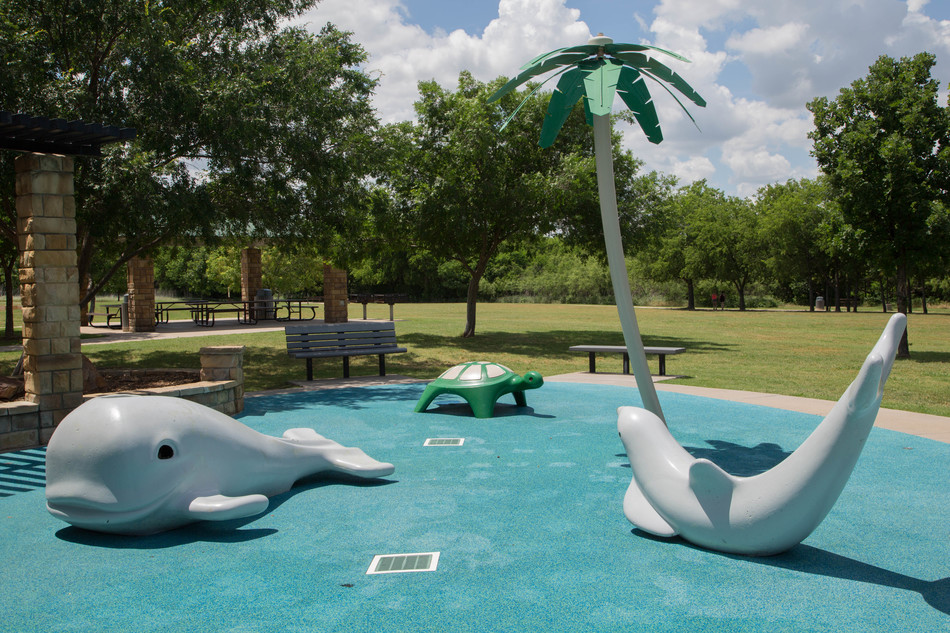I live in a community that has tennis courts, a hockey rink, basketball courts, a playground, and a splash pad. The biggest hit for my kids, by far, has been the splash pad.
Over the past few years, my kids have logged countless hours running, playing, and splashing in the sprinklers, buckets, and fountains.
Not once did I ever worry that they were in danger. Not once did it cross my mind that it could pose a potential health risk. Or, worse, be fatal.
Until now.
A Texas child died earlier this month after contracting a brain-eating amoeba while playing at a neighborhood splash pad.
He (or she) was hospitalized on September 5th with primary amoebic meningoencephalitis, a rare and often fatal infection caused by an amoeba called Naegleria fowleri. Less than a week later, he was gone.
Health officials say he contracted it during a visit to the Don Misenhimer Park in Arlington. The child attended the park 3 times in late August/early September.

The city of Arlington released a statement on Monday saying in part:
A Tarrant County Public Health investigation determined two possible sources for the child’s exposure to water containing N. fowleri: the family’s home in Tarrant County or the Don Misenhimer Park splash pad in Arlington.
On Sept. 24, the Centers for Disease Control and Prevention confirmed the presence of active N. fowleri ameba at the splash pad from water samples and determined the Arlington site was the likely source of the child’s exposure.
The city closed down the splash park on September 5th after being notified of the child’s illness. No other instances have been reported. The city of Arlington also shut down ALL public splash pads for the remainder of the year.
The investigation revealed that human negligence is to blame.
Records show that Parks and Recreation employees failed to conduct the required daily water quality testing.
Additionally, inspection logs found that water chlorination readings were not documented at the Don Misenhimer splash pad on two of the three dates that the child visited. The day after the child’s last visit, chlorine levels were below the minimum requirement.
Chlorine is used as a disinfectant to prevent harmful organic matter.
What is doubly concerning is that this negligence was not just isolated to the Don Misenhimer Park.
Further investigation showed a lack of daily testing at another public splash park, The Beacon Recreation Center.
Deputy City Manager Lemuel Randolph said:
We have identified gaps in our daily inspection program. Those gaps resulted in us not meeting our maintenance standards at our splash pads.
All of the splash pads will remain closed until we have assurance that our systems are operating as they should, and we have confirmed a maintenance protocol consistent with city, county, and state standards.
In an attempt to prevent this tragedy from happening again, the City of Arlington is conducting a thorough review of splash pad equipment and supplies, maintenance, and water quality inspection policies, procedures, and training.
Naegleria fowleri is a tiny, single-celled organism commonly found in warm freshwater and soil.
It can also be found in poorly maintained or unchlorinated pools.
According to the CDC, the amoeba enters your body through your nose. It then travels up the nose to the brain where it destroys the brain tissue.
A person cannot be infected with Naegleria fowleri by drinking contaminated water.
Symptoms show up about 5 days after infection.
These include headache, fever, nausea, or vomiting. As the infection progresses, symptoms can include stiff neck, confusion, lack of attention to people and surroundings, loss of balance, seizures, and hallucinations.
Primary amoebic meningoencephalitis progresses quickly. It almost always results in death. According to the CDC, the fatality rate is over 97% and death occurs within 1 – 12 days.
Naegleria fowleri infections are rare.
The CDC reported 34 cases in the U.S. between 2010 and 2019.
The CDC website reads:
Of those cases, 30 people were infected by recreational water, 3 people were infected after performing nasal irrigation using contaminated tap water, and 1 person was infected by contaminated tap water used on a backyard slip-n-slide.
While extremely rare, this is sadly not the first case of its kind.
Last September a 6-year-old boy, Josiah Christopher McIntyre, suffered the same fate. He contracted a brain-eating amoeba from a splash fountain in Lake Jackson, Texas. 5 days after the onset of symptoms he passed away.
Both of these deaths are heartbreaking. These children should be playing games and hanging out with their friends. They should be going to parks, and riding bikes, and talking endlessly about Minecraft.
They should be laughing and giggling and having fun. And they should have had the chance to grow up to live long and full lives.
Our hearts go out to their families. Here’s hoping that no other parent will have to suffer the same tragedy.











